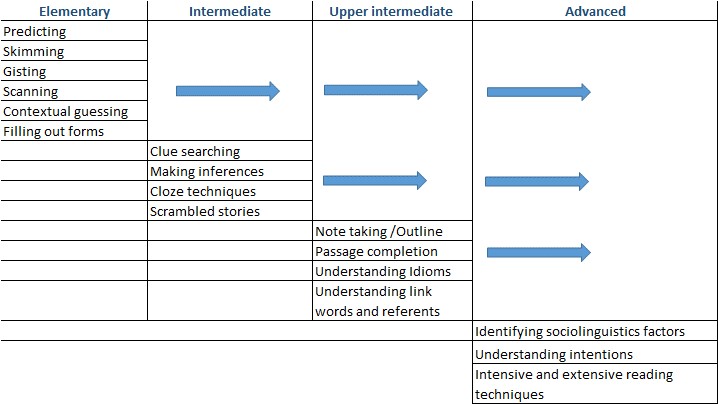In language teaching, the development of Reading Comprehension skills in our students is still a pending task to be carried out urgently. As with all difficult tasks, it is good to start with small but firm steps.
What hinders the development of reading comprehension skills? Think methodology and consider the following strategies:
1. Analyze the textbook you are using. Check for excessive use of a question format throughout the textbook. There are many textbooks where the task to be completed in a reading activity is always the same or a combination of these three: a “True or False” exercise, a “yes / no” exercise, or answering questions starting with what, when, where, how and who. Keep in mind that by working with these types of questions, your students may give you a correct answer without understanding the text! This practice highlights the high risk of reinforcing meaningless mechanical work in reading comprehension. If you are not convinced of this try giving your students the following sentence:
“Splag grigged the flug spraggily in the scroog”. (1)
and you’ll see that without understanding its meaning, they will come up with the right answers for a what, where, how and who question.
(1) Parrot Martin, Task for Language Teachers
2. Don’t let your students read a passage two or three times without changing the task.
This teaching strategy helps combat the mechanization of students’ reading process. Remember that each time they read a passage, they need to perform a different task. For example, the task of a first reading would be to capture the essence of the main idea, the one of a second reading, to obtain specific information and a third to identify new words and deduce their meaning from context.
3. Have a clear understanding of the objective you want them to achieve. State your objectives considering that they vary according to the proficiency of your students in the foreign language.
The following chart gives us a quick glance into many more interesting tasks than T/F or Yes/ No questions

Adapted from: Omaggio, Alice C. Teaching Language in Context.
4. Reading comprehension or pronunciation practice?
Many textbooks include a read-aloud practice when working through a passage. However, it should be noted that a read-aloud activity is excellent pronunciation practice, but NOT a reading comprehension one.
5. Have your students reflect on the effectiveness of their own techniques in dealing with a reading comprehension activity. Here are some commonly used strategies: determine whether they are effective or ineffective:

The development of reading comprehension skills in our students begins with the teacher’s awareness that reading is a vital skill for them. It is an essential skill for a person to develop their ability for autonomous learning. Without it, a person will not have the possibility to develop critical thinking.
(Ineffective: No.2, 5 and 6)











Quiero ir a Corea
Plis y también a México
Comments are closed.